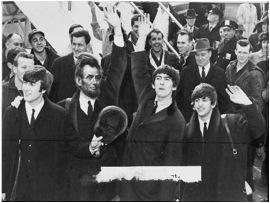It wasn’t too long after the July/August issue of the mid-Atlantic edition of AAA World magazine reached subscribers that Mike Caddell and his colleagues began receiving the emails. When I spoke with him this week, he said they were still coming in.
This edition of AAA World is sent to over two million households in the mid-Atlantic region of the country. (AAA members receive the magazine as part of their benefits.) Caddell said they usually receive two or three pieces of feedback per story in the print edition. As for the most recent issue?
“We’re reaching about twenty [times] that amount so far for the Ghost Fields article,” he said.
Here’s the opening of that article; see if you can spot why people might be reacting to it:
On June 16, 1964, President Abraham Lincoln told a crowd in Philadelphia, ‘War, at the best, is terrible, and this war of ours in its magnitude and duration, is one of the most terrible. …
Yes, that should be 1864, not 1964. Caddell said the team of seven that puts out the magazine were embarrassed to discover such an obvious error about a historic moment—and in the first sentence of the story, no less.
“The whole team is a little disappointed,” he said. “We all split up the duties [for the magazine] and we like to think we do a very good job, and unfortunately this one did slip by all of us.”
It’s what they did next that has garnered the publication recognition and praise, and that also provides a lesson for other news organizations for how to make the most of an unfortunate typo.
Here’s the correction Caddell posted on the magazine’s online message board earlier this week:
Many of you noticed a slight error in our July/August feature, Ghost Fields, where we suggested that President Lincoln delivered a speech in Philadelphia on June 16, 1964. The actual date of the president’s speech was June 16, 1864. Of course, everybody knows that Abe was touring with the Beatles in 1964 (photographic evidence below). Needless to say, we’re truly embarrassed. We apologize.
The whole situation made us realize that Abe’s whereabouts were noticeably underreported in the century between the Civil War and the British Invasion. If you have any photographic record of Abe during this time, please feel free to e-mail it to us at: editorial@aaaworld.com or respond to this thread. Assuming your research satisfies our crack fact-checking staff, you may just find your submission in the next AAA World.
“While it was regrettable it seemed especially humorous and it seemed we had an opportunity to take the correction in a different direction than just an apology,” Caddell said.
It’s important that a correction first do the job of communicating the mistake and the accurate information. But I don’t think the use of humor and other devices downgrades the sincerity or effectiveness of the offering. The Guardian helped make its corrections column a favorite of readers thanks to the wit of its former readers’ editor, Ian Mayes. (To read some of his work, scroll to the bottom of this page and read under the heading “Fond Farewell: Ian Mayes.”) The end result is that more people will read the corrections. That’s a good thing for journalism and the public.
In terms of the reaction to its Gettysburg correction, AAA World has not experienced any blowback from the public, though staff did consider that possibility.
“It did come up and we didn’t want any reader to think we were trying to trivialize the mistake,” Caddell said. “… We felt confident people would receive it in the tone that we meant.”
Indeed, this correction is probably the most read in the history of AAA World thanks to the fact that it hit Romenesko, my site, and several others. It also proved popular on the magazine’s message board. When I showed it some love on Twitter, lots of folks retweeted the link and added their praise for the approach. (Remember that the retweet count in the previous link does not count folks who do the old-style Twitter retweets.) “Sense of humor alert!” tweeted Jim Brady of the Journal Register Co.
A correction is in many ways an act of publicity as much as it is a demonstration of accountability and an admission of error. It is an attempt to spread the correct information. But we in the press often hide corrections or present them in such a vague or workmanlike manner that they become the white noise of journalism and fail to reach the intended audience.
Of course, it’s not feasible to make every error/correction shine as above. By adding a sense of style or personality—by making corrections worth reading—we make them more useful and effective.
Correction of the Week
“In a June 17 ‘Brow Beat’ post, Chris Wilson stated that the Harry Potter character Bill Weasley is a werewolf. He was injured by the werewolf Fenrir Greyback, but did not become a werewolf himself since Greyback was not in wolf form at the time. He did adopt some wolf-like characteristics, such as a preference for very rare steaks.” — Slate
Craig Silverman is currently BuzzFeed's media editor, and formerly a fellow at the Tow Center for Digital Journalism.

